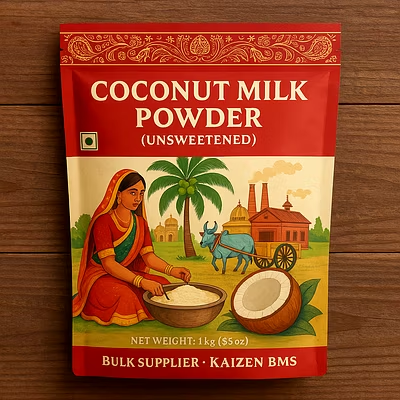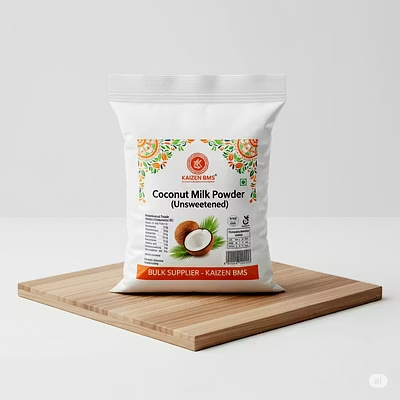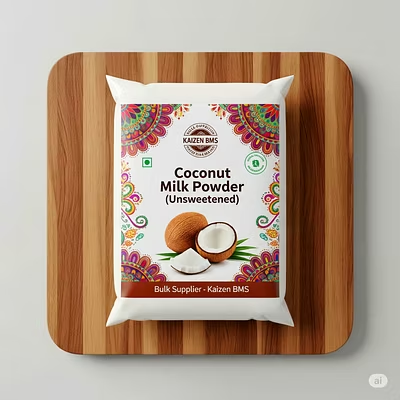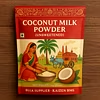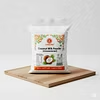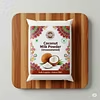Coconut Milk Powder (Unsweetened)
-
Product is not available
Country Of Origin : India
Product Introduction: Coconut Milk Powder (Unsweetened)
Coconut Milk Powder (Unsweetened) is a premium, plant-based ingredient produced by spray drying fresh coconut cream to create a fine, free-flowing powder. This product retains the natural aroma, flavor, and nutritional richness of coconut milk, making it ideal for food manufacturers, beverage companies, bakeries, and culinary professionals seeking a versatile, shelf-stable, and vegan-friendly alternative to dairy. It is easy to store, transport, and reconstitute, providing the creamy texture and taste of fresh coconut milk without refrigeration.
How Coconut Milk Powder Fulfills Client Needs
• Plant-Based & Vegan: Perfect for dairy-free, lactose-free, and vegan product lines.
• Convenience: Long shelf life and easy reconstitution save time and reduce wastage.
• Versatility: Suitable for instant beverages, curries, soups, desserts, bakery, confectionery, and ready-to-eat meals.
• Clean Label: Free from artificial colors, flavors, preservatives, and dairy allergens.
• Consistent Quality: Manufactured under strict quality standards, ensuring safety and reliability for both industrial and retail use.
Product Classification Parameter Details
HSN Code 21069099 (Food preparations, not elsewhere specified; coconut milk powder)
Category Plant-Based Dairy Alternatives
Subcategory Coconut Milk Powder (Unsweetened)
Product Details Nutritional Properties (per 100g)
• Energy: 650–700 kcal
• Fat: 60–70g (mainly saturated)
• Carbohydrates: 20–25g (natural sugars)
• Protein: 6–8g
• Fiber: 2–6g
• Minerals: Potassium, magnesium, calcium, iron
• Vitamins: C, E, B-group (trace amounts)
• No added sugar, dairy, or preservatives
Technical Properties
• Solubility: Excellent, disperses rapidly in warm water
• Shelf Life: 12–18 months (sealed, ambient)
• Moisture Content: ≤ 2.5%
• Bulk Density: 300–480 g/l
• Mesh Size: 100% passes #40 mesh
• Microbiological Standards: Total plate count ≤ 5,000 cfu/g; yeast & mold ≤ 100 cfu/g; E. coli, coliforms, Salmonella absent167
Chemical Properties
• Main Components: Coconut fat, carbohydrates, proteins, minerals
• Free Fatty Acids: ≤ 0.1%
• pH: 5–7
• No dairy, gluten, or artificial additives
Physical Properties
• Appearance: Fine, smooth, free-flowing white powder
• Odor/Flavor: Mild, sweet, characteristic coconut aroma and flavor
• Texture: Creamy when reconstituted
Manufacturing Methods
• Extraction: Fresh coconut kernel is grated, pressed, and filtered to obtain coconut cream.
• Pasteurization: The cream is pasteurized for safety.
• Homogenization: Ensures uniform fat distribution.
• Spray Drying: The cream is spray-dried into a fine powder, preserving nutrients and flavor.
• Quality Control: Each batch is tested for microbiological safety, composition, and physical properties.
• Packaging: Packed in moisture-proof, food-grade materials.
Industrial Uses
• Food & Beverage: Curries, soups, sauces, desserts, ice cream, smoothies, vegan dairy alternatives, and bakery products.
• Instant Mixes: Used in ready-to-eat meals, beverage mixes, and vending machine formulations.
• Cosmetics: Ingredient in skin and hair care products for its moisturizing properties.
Market Overview: Global Demand & Indian Supply
• Global Demand: Coconut milk powder is in strong demand in Asia-Pacific, North America, Europe, and the Middle East, driven by the rise in veganism, lactose intolerance, and interest in Asian cuisines.
• Indian Supply: India is a major producer and exporter, recognized for high-quality coconut products and competitive pricing2.
Packaging & Logistics
• Standard Packaging: 1kg, 5kg, and 25kg food-grade aluminum foil pouches or multi-layer kraft paper bags with polyethylene liners.
• Bulk Packaging: 500kg–1,000kg jumbo bags for industrial buyers.
• Shipping Dimensions & Weight:
- 25kg bag: Approx. 80cm x 50cm x 14cm, gross weight ~25.2kg
- Palletized for container shipping (20ft container holds ~16 MT)
• Storage: Store in a cool, dry place away from direct sunlight.
• Lead Time: 1–2 weeks for standard export orders.
Preferred INCO Terms
• FOB (Free On Board)
• CFR (Cost and Freight)
• CIF (Cost, Insurance, and Freight)

